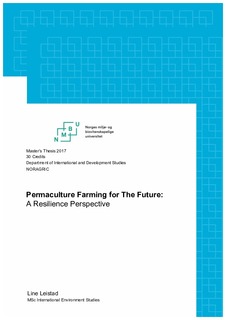| dc.contributor.advisor | Westengen, Ola | |
| dc.contributor.advisor | Bryceson, Ian | |
| dc.contributor.author | Leistad, Line Torbjørnsen | |
| dc.coverage.spatial | Costa Rica | nb_NO |
| dc.date.accessioned | 2017-10-31T12:10:27Z | |
| dc.date.available | 2017-10-31T12:10:27Z | |
| dc.date.issued | 2017 | |
| dc.identifier.uri | http://hdl.handle.net/11250/2463178 | |
| dc.description.abstract | Permaculture has been argued to be a sustainable alternative to industrial agriculture, with the potential to avoid the negative social and ecological consequences associated with large-scale monocultures. Through the lens of social-ecological theory, this study analyzes two permaculture farms in Costa Rica, based on findings from qualitative interviews and participatory observation. The analysis concludes that the farmers’ management strategies closely parallel the pre-defined indicators of farm resilience. Permaculture farming is knowledge-intensive, and requires farmers to be innovative and market responsive. Perennial based systems further represent benefits and challenges. It takes time to establish a productive system that generates income, but the reward is a self-regulating, resilient system. | nb_NO |
| dc.language.iso | eng | nb_NO |
| dc.publisher | Norwegian University of Life Sciences, Ås | nb_NO |
| dc.rights | Attribution-NonCommercial-NoDerivatives 4.0 Internasjonal | * |
| dc.rights.uri | http://creativecommons.org/licenses/by-nc-nd/4.0/deed.no | * |
| dc.title | Permaculture farming for the future : a resilience perspective | nb_NO |
| dc.type | Master thesis | nb_NO |
| dc.description.localcode | M-IES | nb_NO |

